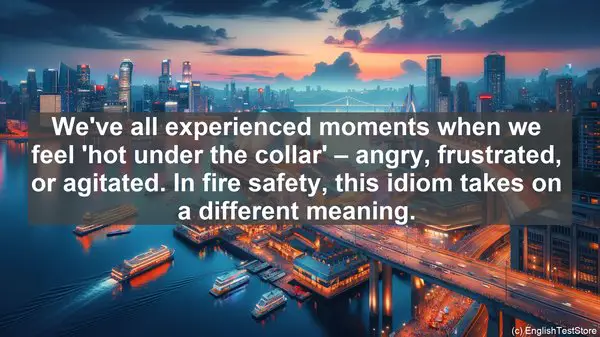Introduction: The Power of Idioms
Welcome to today’s lesson. Idioms are an integral part of any language, and English is no exception. They add color, depth, and cultural nuances to our conversations. But did you know that idioms can also be a valuable tool for a fire inspector? In this lesson, we’ll be discussing the top 10 English idioms that every fire inspector should be familiar with. So let’s dive in!
1. ‘Playing with Fire’
This idiom is often used to describe a situation where someone is engaging in a risky or dangerous activity. As fire inspectors, it’s our job to ensure that people don’t literally play with fire. But this idiom goes beyond the literal meaning. It reminds us to be vigilant and proactive in identifying potential fire hazards.

2. ‘Fire Drill’
A fire drill is a practice exercise to prepare people for a real fire emergency. But in idiomatic terms, a ‘fire drill’ can also refer to a situation or activity that is repetitive, predictable, and lacks excitement. As fire inspectors, we understand the importance of both literal and figurative fire drills. We need to ensure that people are not only prepared for emergencies but also actively engaged in fire safety measures.
3. ‘Up in Smoke’
When something goes ‘up in smoke,’ it means it has failed or been destroyed. This idiom serves as a reminder of the potential consequences of fire incidents. As fire inspectors, our goal is to prevent such situations and ensure that properties, lives, and livelihoods are not lost ‘up in smoke.’
4. ‘Hot Under the Collar’
We’ve all experienced moments when we feel ‘hot under the collar’ – angry, frustrated, or agitated. In fire safety, this idiom takes on a different meaning. It reminds us of the importance of staying calm and composed during emergencies. Panic can often worsen a situation, while a cool-headed approach can save lives.
5. ‘Spark of Inspiration’
A ‘spark of inspiration’ refers to a sudden idea or insight. In fire safety, this idiom emphasizes the importance of innovation and creativity. As fire inspectors, we need to constantly think outside the box, finding new solutions and approaches to fire prevention and safety.
6. ‘Fan the Flames’
When we ‘fan the flames,’ we’re not only making a fire burn brighter but also metaphorically escalating a conflict or a problem. This idiom reminds us of the need to address issues promptly and effectively, before they ‘fan the flames’ and become more challenging to handle.
7. ‘Burn the Midnight Oil’
Fire safety is a round-the-clock responsibility. This idiom, ‘burning the midnight oil,’ signifies working late into the night. As fire inspectors, we understand that emergencies can happen at any time, and we need to be prepared, even during the late hours.
8. ‘Smoke and Mirrors’
In fire safety, ‘smoke and mirrors’ refers to deceptive or misleading tactics. It serves as a reminder for us to be vigilant and not be fooled by appearances. Fire hazards can sometimes be hidden or camouflaged, and it’s our job to uncover them.
9. ‘In the Line of Fire’
When someone is ‘in the line of fire,’ they’re in a dangerous or vulnerable position. This idiom highlights the risks that firefighters and other first responders face daily. As fire inspectors, we work closely with these brave individuals, ensuring that their environment is as safe as possible.

10. ‘Fire and Brimstone’
This idiom is often used to describe a passionate, forceful, or intimidating speech. In fire safety, it reminds us of the importance of effective communication. Whether it’s educating the public, training personnel, or conveying safety protocols, our words need to be impactful and persuasive.
Conclusion: The Language of Fire Safety
And there you have it – the top 10 English idioms for a fire inspector. These idioms not only enrich our language but also provide valuable insights into the world of fire safety. So the next time you come across one of these idioms, remember its literal and figurative meanings. Stay safe, and until next time, take care!
